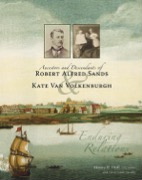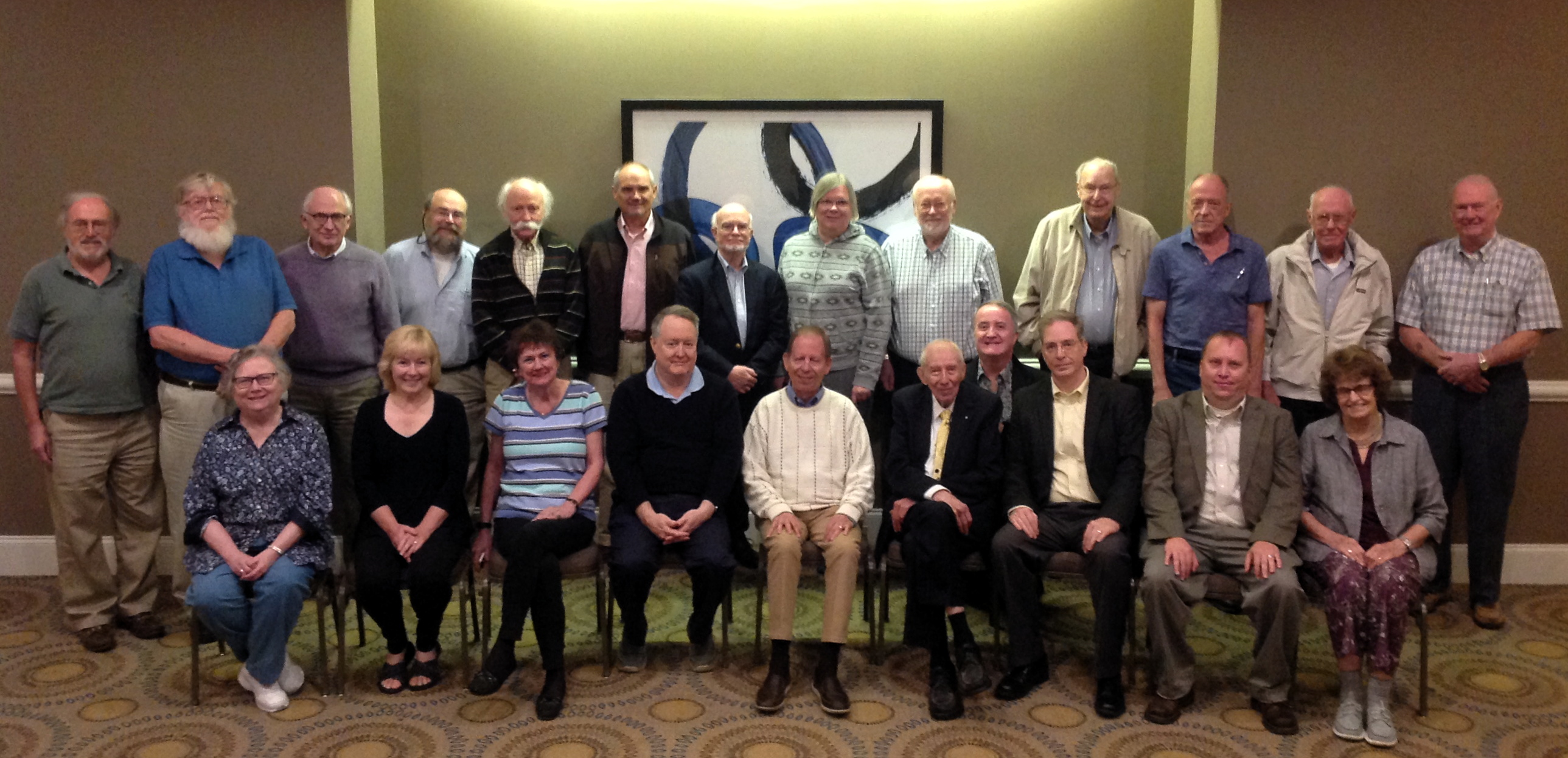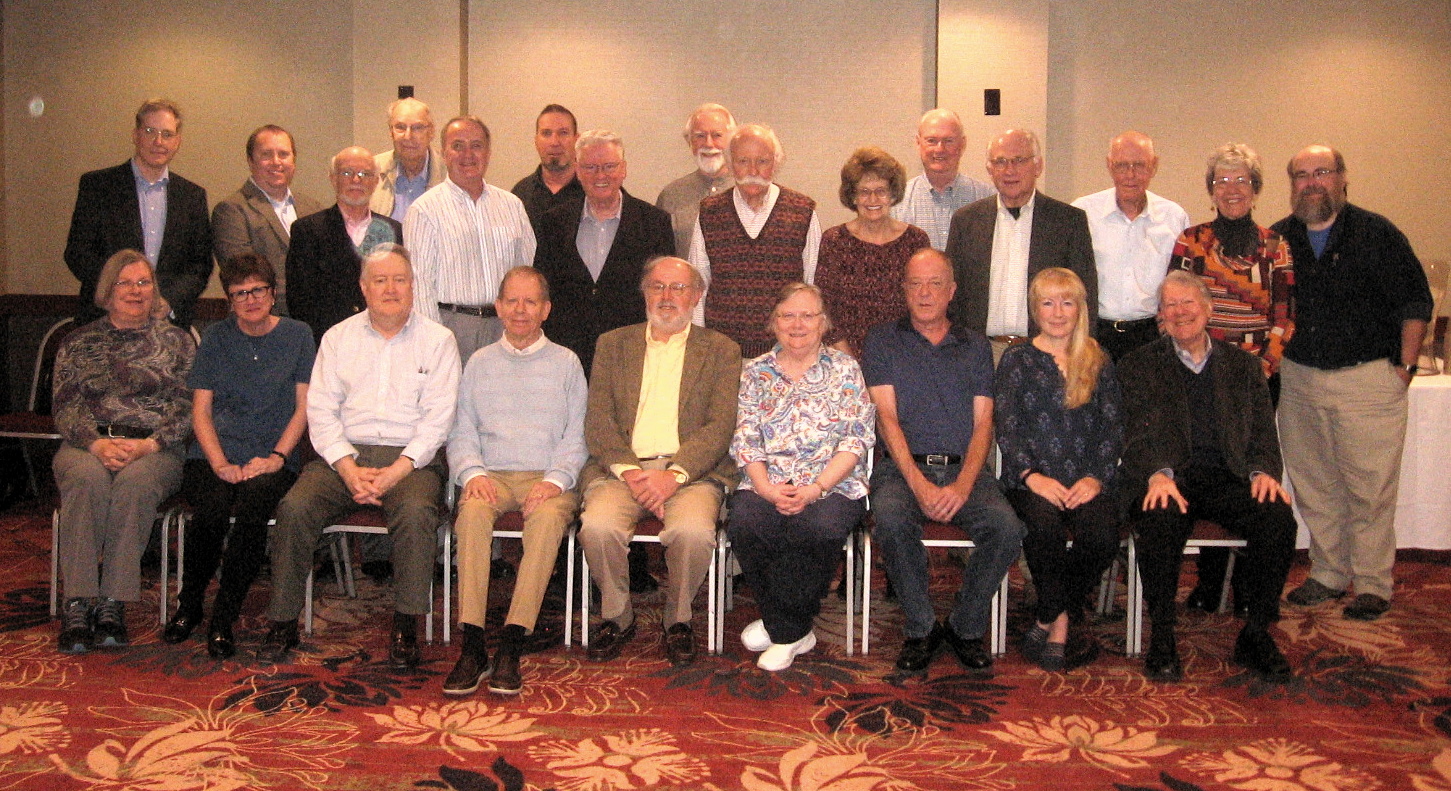 At the National Genealogical Society conference in St. Charles, Missouri in May 2019, Henry B. Hoff, CG, FASG, and Nancy Sands Maulsby received the NGS’s Award for Excellence in the Genealogy and Family History Book category for their book Ancestors and Descendants of Robert Alfred Sands and Kate Van Volkenburgh (Boston: Newbury Street Press, 2018). This illustrated hardcover book tells the story of Maulsby’s immigrant ancestors who came to New York and achieved success in finance and medicine.
At the National Genealogical Society conference in St. Charles, Missouri in May 2019, Henry B. Hoff, CG, FASG, and Nancy Sands Maulsby received the NGS’s Award for Excellence in the Genealogy and Family History Book category for their book Ancestors and Descendants of Robert Alfred Sands and Kate Van Volkenburgh (Boston: Newbury Street Press, 2018). This illustrated hardcover book tells the story of Maulsby’s immigrant ancestors who came to New York and achieved success in finance and medicine.
Category Archives: Uncategorized
Fellows Jones and Mills Receive BCG Honors
At a luncheon held in St. Charles, Mo. last month, the Board for Certification of Genealogists (BCG) announced the first three recipients of the Donn Devine Award for Extraordinary Service. The award, established in honor of longtime BCG trustee Donn Devine, who died last month at the age of 90, recognizes those who have made important and lasting contributions to BCG. Two of the three recipients were Fellows: Thomas W. Jones, Ph.D., CG, CGL, FASG, FNGS, FUGA, and Elizabeth Shown Mills, CG, CGL, FASG, FNGS, FUGA.
Thomas W. Jones achieved BCG certification in 1994, and earned the Certified Genealogical Lecturer (CGL) credential in 2000. His contributions to BCG’s mission include a collaborative leadership role in the development and evolution of genealogical standards, the education of thousands of genealogists, and a body of literature considered essential reading. He served as a BCG Trustee from 1997 to 2007 and 2011 to 2014. He was a member of the Executive Committee for three years and President from 1999 to 2002. He was a key player in BCG’s publication of The BCG Genealogical Standards Manual (2000). He served as editor of Genealogy Standards (2014) and edited its second edition published in 2019. He was elected a Fellow of the American Society of Genealogists in 2007. As writer, lecturer, and teacher, he has promoted the upholding of high genealogical standards to thousands.
Elizabeth Shown Mills earned the CG credential in 1976, and CGL in 1988. She has continuously served BCG behind the scenes and publicly as a trustee and officer totaling twenty-four years. She held the executive offices of President (1994 to 1996), Vice President (1989 to 1994), and Member at Large (1996 to 1997). She was elected a Fellow of the American Society of Genealogists in 1981. One of America’s best-known genealogists, her service to BCG has extended beyond the offices she held—notably in her roles as scholar and mentor. She led the movement to elevate the field of genealogy to an academic social science. She encourages new genealogists and seasoned associates to uphold genealogical standards, seek the best sources, assess their validity, and critically analyze the evidence to solve genealogical problems. She has shaped the intellectual direction of the field through writing, editing, teaching, and modeling amity, generosity, inquiry, and integrity.
Fellow George Harrison Sanford King named to the National Genealogical Society Hall of Fame
Fellow George Harrison Sanford King (1914-1985) is the 2019 inductee into the National Genealogy Hall of Fame. He was nominated by the Virginia Genealogical Society, and the announcement was made at NGS’s 2019 Family History Conference dinner held in St. Charles, Missouri on May 10, 2019.
A native and lifelong resident of Fredericksburg, Va., George was elected a Fellow in 1947 as No. 53 on the Roll.
George was an expert on the complex family relationships of Virginia’s Northern Neck, an area that includes what are often referred to as burned counties. In 1938 George began a series of articles for Tyler’s Quarterly Historical and Genealogical Magazine entitled “Copies of Extant Wills from Counties Whose Records Have Been Destroyed.” This series, which contained extensive genealogical notes and pedigrees, ran until the Quarterly was discontinued in 1951.
Using numerous sources, he made extensive notes and transcriptions on early Virginia families. A card index to his more than 100,000 papers is available at the Virginia Historical Society and abstracts are being published in the Magazine of Virginia Genealogy. The card index and all papers have been scanned and are freely available on FamilySearch (familysearch.org/search/catalog/1878857. In the catalogue, the first fifteen DGS numbers lead to the card file; the rest of the DGS entries lead to the papers). George published numerous other genealogical and historical articles and authored several books.
In the ASG Newsletter (vol. 43 no. 2 [June 1985]), Milton Rubincam quoted part of his obituary in The Free Lance-Star of Fredericksburg:
Mr. King was widely respected for his outstanding knowledge of Virginia history and old Virginia families. He often astounded people by reciting lineages from memory, a gift that made him a popular figure at family reunions. While he had a talent for entertaining with humorous stories of the past, his approach to genealogy was strictly scholarly . . . A stickler for detail, he frequently denounced family histories that he felt were based more on conjecture than existing record. “Family stories are nice but they usually have little to do with fact,” he once said.
George has been added to the list of Fellows named to the National Genealogical Society Hall of Fame.
ASG Scholar Award for 2019 to Jan M. Joyce
At their meeting in Richmond, Virginia, on October 13, 2018, the Fellows of the American Society of Genealogists granted their annual ASG Scholar Award to Jan M. Joyce of Los Altos Hills, California, for her article, “796 Acres Acquired in 36 Years: A Story of Land Acquisition and Its Cagey Distribution in Holmes County, Ohio.” The ASG Scholar Award rewards talented genealogists with stipends to pursue advanced academic training in genealogy.
Photo Archive—2018 Meeting
Here are 23 of the Fellows at the ASG annual meeting held Saturday, 13 October 2018 at the Richmond Marriott, Richmond, Virginia.

Seated: Williams, Byrne, Hatcher, J. Anderson, H. Jones, Dorman, Dwyer (kneeling), Taylor, Murphy, Bamberg.
Standing: Dearborn, R. Anderson, Saxbe, Remington, Hill, Stott, Joslyn, Mathews, J. Hansen, Harris, Baldwin, C. Hansen, Hart.
ASG Scholar Award for 2019: Applications Now Open
Applications are now being accepted for the ASG Scholar Award for 2019 (deadline: August 31, 2018). This annual grant of $1000 is awarded for study at one of six major academic genealogical programs in the United States (listed below). Candidacy for the award is open to all genealogists, genealogical librarians, and researchers working in related fields. Applicants submit a published work or a manuscript of work in progress, to be judged by a panel of three Fellows. The goal of the award is to recognize talent and build genealogical expertise by providing promising genealogists the opportunity to receive advanced academic training in genealogy.
The award granted in October of each year is to defray costs of attending a program in the following calendar year.
The ASG Scholar Award provides financial assistance for a developing scholar to attend one of six academic programs in American genealogy: the Institute of Genealogy and Historical Research (IGHR), held in Athens, Georgia, under the auspices of the Georgia Genealogical Society (formerly based at Samford University, Birmingham, Ala.); the Genealogical Institute on Federal Records (Gen-Fed), formerly NIGR, in Washington, D.C.; the Certificate Program in Genealogical Research at Boston University; the Salt Lake Institute of Genealogy (SLIG); or the Genealogical Research Institute of Pittsburgh (GRIP), or one of two online courses, Advanced Genealogical Research (GENE 350) or Genetic Genealogy (GENE 201), at Excelsior College, Albany, New York. The recipient of the ASG Scholar Award may register for the program of his or her choice. The award is given in October of each calendar year, with the intention that it is used for genealogical study in the following calendar year.
- The Genealogical Institute on Federal Records (Gen-Fed), formerly NIGR, held for one week each July and based at the National Archives in Washington, D.C., is the nation’s oldest institute for genealogical education, founded in 1950. Gen-Fed provides a unique program of advanced instruction in the use of National Archives records. Write to: Gen-Fed Director, P.O. Box 24564, Baltimore, MD 21214.
- The Institute of Genealogy and Historical Research (IGHR), held for one week each June, was founded in 1964 to provide a structured program of genealogical study at an academic level. Based through 2016 at Samford University, Birmingham, Alabama, it moved to Athens Georgia in 2017, and is affiliated with the Georgia Genealogical Society. IGHR offers tracks of study, ranging from beginning to advanced research methodology, professional genealogy, and other specialized topics. Contact: Laura Carter, IGHR Director, 3710 Barnett Shoals Road, Athens GA 30605-4712.
- The Certificate Program in Genealogical Research at Boston University consists of five modules, offered on Saturdays in seven-hour sessions: Foundations, Technology, Evidence, Forensic, and Ethnic and Geographic Specialties. Write to: Center for Professional Education, 1010 Commonwealth Ave., 2nd Floor, Boston MA 02215.
- The Salt Lake Institute of Genealogy (SLIG), sponsored by the Utah Genealogical Association, is in its 20th year and is a week-long intensive educational experience that takes students deep into their topic of choice. SLIG is dedicated to offering courses that fill a high-intermediate and advanced-level educational need. However, each year a handful of courses are included which provide a wealth of information and background information required to help intermediate and transitional genealogists strengthen their core understanding of the research process. Write to: The Utah Genealogical Association, PO Box 1144, Salt Lake City, UT 84110 or contact info@ugagenealogy.org.
- The Genealogical Research Institute of Pittsburgh (GRIP), located in Pittsburgh, Pennsylvania. The instructors are all experienced genealogical researchers, lecturers, and writers who bring their expertise into the classroom with case studies and problem solving exercises. The students come from a wide variety of backgrounds but all share their passion for family history and for learning how to efficiently break down “brick wall” genealogical puzzles. Various different week-long genealogical courses which incorporate hands-on learning in a state-of-the-art and friendly community atmosphere. Write to: GRIP of Pittsburgh, PO Box 44, Wexford, PA 15090.
- GENE 350 (Advanced Genealogical Research—15 weeks) or GENE 201 (Genetic Genealogy—8 weeks) at Excelsior College, Albany, New York. These undergraduate credit-bearing courses are taught online by leaders in the field and meet or exceed standards for both genealogy and genetic genealogy.
Applications
Applicants for the ASG Scholar Award for 2019 should apply before August 31, 2018, by submitting the items below:
- a résumé that emphasizes activities relating to genealogy and lists the applicant’s publications in the field, if any (prior publications are not necessary).
- a manuscript or published work of at least 5,000 words, demonstrating an ability to conduct quality genealogical research, analyze results, and report findings in an appropriately documented fashion. If the submission is to be returned, it should be accompanied by an envelope or bagging with sufficient postage.
- a statement (100–150 words) which (1) identifies the individual’s choice of program and (2) explains why the individual feels that attendance will enhance his or her growth as a genealogical scholar.
The ASG Scholarship Committee, chaired by the ASG vice-president, will make the selection for the award. Announcement of the award winner will be made by October 15, 2018. Applications should be addressed to:
Joseph C. Anderson II, Chair
ASG Scholar Award Committee
5337 Del Roy Dr.
Dallas TX 75229-3016Email submission is preferred, to: jca2nd@gmail.com
Read more about the award and see a list of past recipients at Awards > ASG Scholar Award.
New Fellow: Rachal Mills Lennon
The Fellows of the American Society of Genealogists (ASG) held their annual meeting on Saturday, October 7, 2017, in Salt Lake City, Utah. Rachal Mills Lennon of Hendersonville, Tennessee, was elected to the Society as its 167th Fellow.
Rachal Mills Lennon has been a Certified Genealogist since 1987. Her research focuses on challenging problems in the American South, especially those involving African Americans, Native Americans, and white yeoman farmers. Along with numerous scholarly genealogical articles in The National Genealogical Society Quarterly and The American Genealogist, her published work includes a compiled genealogy, Some Southern Balls: From Valentine to Ferdinand and Beyond (Tuscaloosa, Ala., 1993), and a methodological guide, Tracing Ancestors among the Five Civilized Tribes: Southeastern Indians Prior to Removal (Baltimore, 2002), which is one of the cornerstone references for Native American genealogy.
Certificate of Appreciation Awarded to Eric G. Grundset
Since the 1960s, the American Society of Genealogists has occasionally granted a Certificate of Appreciation to an individual or organization in recognition of extraordinary contributions to the discipline of genealogy. At its Annual Meeting on October 7, 2017, the Society awarded a Certificate of Appreciation to Eric G. Grundset, in recognition of his superlative series of definitive state-based bibliographies of the American Revolution, published since 2013. To quote from the nomination:
“Our field’s most important bibliographic work to appear in the past decade is Eric G. Grundset’s series of source guides to the American Revolutionary era. To say that Grundset’s work is comprehensive is an understatement. His lifetime of study, across a career as Library Director and Director of Publications for the National Society Daughters of the American Revolution, is now compiled into seven oversized volumes focusing on eight key states—nearly 5,000 pages of explicitly cited materials. Grundset’s coverage of books, periodicals, manuscripts, and maps—in print, online, and buried in archives—embraces all regions, ethnic groups, and churches, as well as individual families and political and military leaders.”
Photo Archive: 2017 Meeting
Here are 24 of the Fellows at the ASG annual meeting held Saturday, 7 October 2017 at the Plaza Hotel, Salt Lake City, Utah.

Seated: Mathews, Hatcher, J. Anderson, H. Jones, Dearborn, Williams, Baldwin, Byrne, T. Jones.
Standing: Taylor, Murphy, Joslyn, Harris, Dwyer, Reed, Sperry, Smith, Hill, Bamberg, Hart, Saxbe, C. Hansen, Hinchliff, Remington.
ASG Scholar Award for 2018 to Stephanie K. West
At their meeting in Salt Lake City on October 7, 2017, the Fellows of the American Society of Genealogists granted their annual ASG Scholar Award to Stephanie K. West of Lodi, California, for her article, “Who Was the Father of George W. West of Tioga County, Pennsylvania?” The ASG Scholar Award rewards talented genealogists with stipends to pursue advanced academic training in genealogy.
